2009 Hyundai Genesis
FAST FACTS
| 1. The Genesis was named North American Car of the Year, marking the first time Hyundai or any Korean manufacturer, has earned the title. |
| 2. Top-line models come with a powerful 375hp 4.6-liter V-8 engine. |
| 3. Standard equipment includes a push button ignition, moonroof, 14-speaker sound system, dual-zone climate control system, memory seats with a power adjustable steering column and a power rear sunshade, just to name a few. |
They say timing is everything, but for Hyundai, that aphorism may have a more special meaning. With the current economic state in this country and throughout the world, one might think it wouldn’t be the best time to launch a luxury car. However, for Hyundai, the timing of the launch of their new Genesis models may just prove to be the perfect timing. Huh?
Let me explain. The new Hyundai Genesis 4.6 is an outstanding rear drive luxury car. It hits virtually all the high notes that one would expect from a car in this class, except one… price. This new luxury gem is priced thousands of dollars lower than the competition from America and from Europe, so I believe it arrives at just the right time when folks are looking to save some money, without giving up quality and luxury. The word for that is value, and the Genesis is just teeming with it.
A LONG LIST OF LUXURY AMENITIES
When most people think of a luxury car they think of comfort and amenities, and those qualities are most evident inside the cabin. The Genesis features a sumptuous leather interior, with plush comfortable heated seats. The seats have three heat settings, and on a cold Chicago winter morning when the temperature was down to single digits, the high setting felt like it would fry an egg after about five minutes. The dash on the test car was covered in black leather with a chocolate leather insert running its full width and carried over into the door trim panels. All seams and stitching were impeccable. A sprinkling of polished wood trim finished off the look quite nicely.
Standard features include keyless entry with push button ignition, tilt/slide moonroof, a 14-speaker sound system, Bluetooth phone system, rain sensing wipers, heated electromagnetic side and rearview mirrors, tire pressure monitors, and a leather and wood steering wheel with cruise control, radio, and telephone controls on it. There is also a dual-zone climate control system, memory seats with a power adjustable steering column, a power rear sunshade, a full cabin airbag system, and much more. My test car featured a $4,000 Technology Package which adds a 526-watt, 17-speaker sound system with XM radio, 6-disc DVD changer, a navigation system with rear back-up camera with front and rear parking assist sensors, auto leveling headlight system, and even a cooled drivers seat to go along with some other goodies. Pampered is a good word to describe how the driver and passengers will feel in the Genesis.
The folks at Hyundai were clearly aiming to compete with Lexus, Mercedes, and BMW models, and succeed quite nicely. Unfortunately, Hyundai copied BMW’s I-Drive system, which has a large round dial on the center console to control many of the navigation and settings functions of the vehicle. I hate that system in the BMW, and while Hyundai’s system is not nearly as cumbersome, I still prefer to have the controls dash mounted. At least the Genesis has the heating controls laid out in the center of the dash, and they are easy to use.
There is class-leading room for front seat passengers, and if those sitting in front aren’t starting forwards for an NBA team, the rear passengers will have almost limousine like legroom. The Genesis is longer than a 5-series BMW or E-Class Mercedes, and about the same size as a Lexus LS460. And the cavernous trunk has 16 cubic feet of usable storage space.
The cabin is exceptionally quiet, owing to both the fit and finish of the car, as well as to Hyundai’s extensive use of structural adhesives which when applied to the body shell, it improves stiffness and damps out vibrations.
375 HORSEPOWER 4.6-LITER V8 ENGINE
The heart of this Genesis is the new “Tau” 4.6-liter V-8, which puts out a huge 375 horsepower, with 333 ft-lbs of torque at 3500-rpm using premium gas. You may, however choose to use regular gas if you like, but you’ll lose 7 horsepower and 9 ft-lbs of torque if you do. While the motor breaks no new ground, it is one of the most powerful motors on the market for its size, and still manages to get 17 mpg in the city and 25 mpg on the highway. My weeklong stint with the car backed up those figures, which is remarkable considering the cars size and hefty 4,000-lb. curb weight.
Mated to the 4.6-liter engine is a six-speed ZF Shiftronic transmission which gets high marks for smoothness, and can propel the car from zero to 60 in 5.6 seconds, (faster than a Porsche Boxster) and turn quarter-mile times in just a tick over 14 seconds. The Genesis doesn’t have the paddle shifters behind the steering wheel, which have become popular with many carmakers, but I’ve always found them to get in the way, and prefer the stick shift on the console, anyway. The ABS brakes are excellent when it’s time to haul the big sedan down from speed with good feel and feedback.
The Genesis features a sophisticated multilink suspension set-up front and rear, with many parts being made of lightweight aluminum. It also features Electronic Stability Control and Traction Control. The result is a quiet refined ride that handled the pot-holed Chicago roads with composure. Equipped with Dunlop SP Sport tires (235/5018) Hyundai claims it pulls higher G-forces than either a Mercedes E550 or BMW 550 on skid pad tests. The difference, however, is that I felt more body lean with the Genesis than I did with the other two cars. Tossable is not a term you’d use for the Genesis, but it isn’t designed to be a sports sedan. The car exhibits some understeer, but it still feels well balanced and planted throughout a turn. So while the Genesis performs quite nicely on all kinds of roads, Hyundai has biased the ride quality more on the luxury side of the scale, than the sporting side. That is neither good, nor bad; it’s just a matter of personal preference, and the types of roads you’ll spend the majority of your time on.
HANDSOME AND UPSCALE, IF GENERIC
The Genesis styling is somewhat derivative, with styling cues lifted from Lexus, Mercedes and BMW. The result is a handsome, upscale, yet somewhat generic look. Its shape is pleasant, the front grill will catch the eye, and the whole look is understated.
HYUNDAI’S BUSINESS MODEL
Hyundai has built their reputation over the last 24 years by marketing high quality cars, backed by an excellent warranty, loaded with content, for less money than the competition. They began with small economy cars, and began to slowly increase the breadth of their model offerings, and size of their vehicles. It looks like they stole the playbook from Honda, Toyota and Nissan. They now offer vehicles in virtually every market segment, except trucks.
When Hyundai introduced the Azera model a couple of years ago, most folks anticipated that they were going to be content to compete in the “near luxury” market, and leave it at that; so the Genesis came as a surprise to most folks in the industry. And after the initial rave reviews from the motoring press, including being named the North American Car of the Year, I think they’ve got a lot of the competition running scared. The base price of the 4.6 Genesis is $37,250, adding $4,000 for the tech package, to reach $41,250. A similarly equipped BMW 550i will require writing a check for over $60,400 a Mercedes E-550 starts at $63,200, and a Lexus LS460 is about the same. And while the Hyundai brand name doesn’t have nearly the same cache as the others, it certainly has the chops to compete in a brand-neutral comparison – or a down-turned economy
Perhaps Hyundai was prescient when it began to design this car, anticipating the economic climate the Genesis would face when it came out, and decided not to spin off the car into it’s own brand name, incurring the huge up front costs of developing an entire new dealer network, like Toyota, Honda, and Nissan did with Lexus, Acura and Infinity. This way they were able to plough that money into engineering and building a quality car at a substantial discount to the competition. Or perhaps they were just lucky.
THE VERDICT
If you are in the market for a luxury car with comfort and performance, you’d be hard pressed to find a better car, or a better value. The valet might not park it next to the front door at chic restaurants, but with the money you’ll save, you’ll have plenty left over for eating out several times a week.
POSITVE
- Class leading power and performance
- Loaded with creature comforts and luxury amenities
- Incredible value
NEGATIVE
- Not yet a nameplate to impress your friends
- Fussy multifunction knob to control radio, navigation and other settings
- Generic exterior styling
More by Ken Glassman













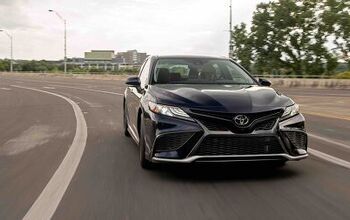


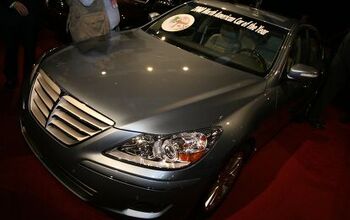


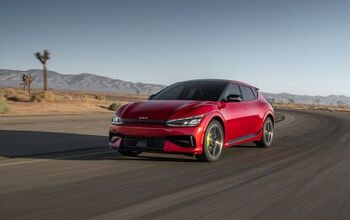
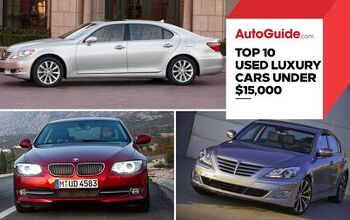

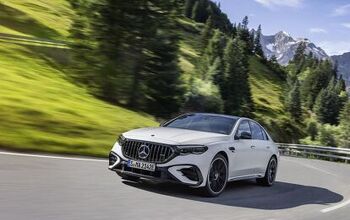
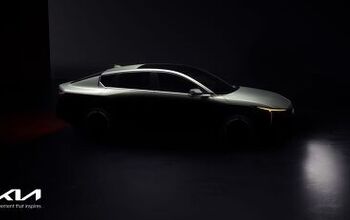
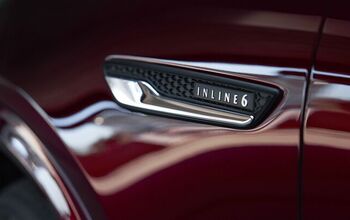
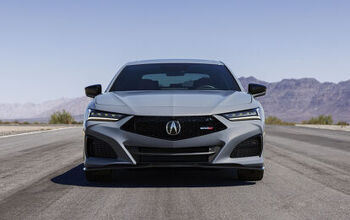
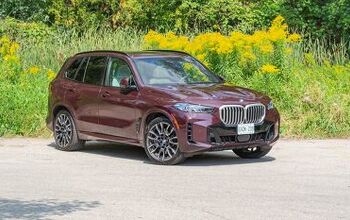
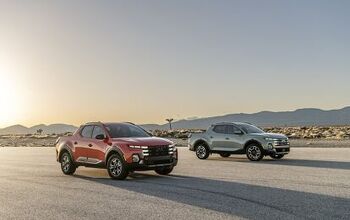
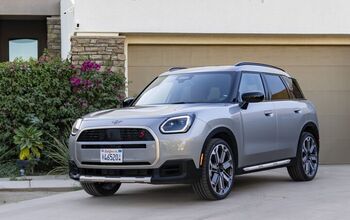

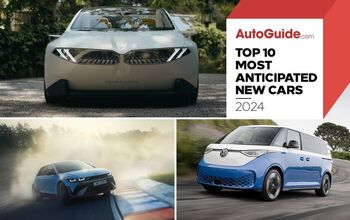
Comments
Join the conversation